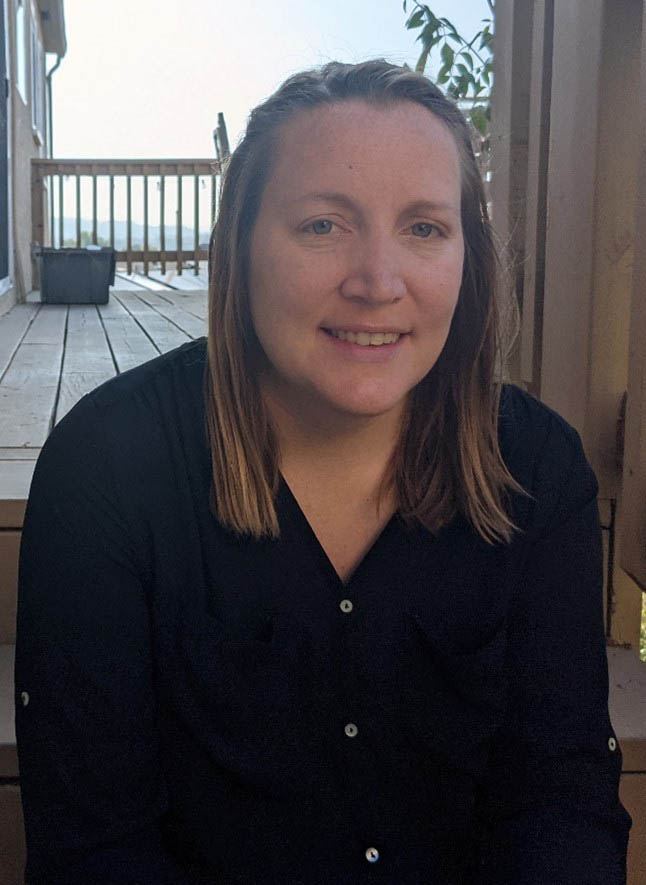Kristin Larson

Kristin Larson is the Office of Energy & Sustainability's new director beginning May 2022. She graduated with a degree in Environmental Sciences from the University of Massachusetts- Amherst and a Master of Environmental Science and Policy degree from John Hopkins University. She has worked in the sustainability space for 12 years. Read this spotlight to hear about Kristin's sustainability origin story, goals for sustainability at SDSU, advice for current students, and more!
What is your sustainability origin story?
“Growing up, I spent a lot of time outside camping, playing in the woods behind my childhood home, and visiting lakes in upper Michigan. I hear a lot of people who are passionate about the environment attribute that passion to time spent outdoors as a child. In college at the University of Massachusetts Amherst, I studied environmental sciences, but I didn’t declare the major until my sophomore year. I came in undeclared and debated between environmental sciences and criminal justice, two completely different fields. Finally, I declared a major in environmental sciences with a minor in wildlife and fisheries conservation.”
As director, what are some of your goals for the Office of Energy & Sustainability here at SDSU?
“We have a lot of ambitious goals outlined for the year. We want to implement a campus-wide food waste collection program because not only does that save on greenhouse gas emissions, but it also saves the university money. We are doing a pilot food waste collection program and the goal is to bring that to all offices and housing. We are slowly inching towards that goal.
On the energy side, we want to take advantage of the federal incentives coming out with the Inflation Reduction Act for renewable energy projects on campus. There are solar panels going up at Mission Valley this year but we want to look into more projects. On the transportation side, we are installing more charging stations. A huge state policy was passed in 2020 stating that California will phase out the sale of internal combustion engine (ICE) vehicles by 2035. We’re going to have to provide charging opportunities on campus, so we’re installing 50 more charging station ports this year. Of course, we have the great opportunity to have the trolley station on campus. I want to find a way to really encourage people to take advantage of that.
There are a lot of other behind-the-scenes tasks that I want to get done, such as the metering projects that our sustainability and energy analyst Madeleine Falco is working on. That includes capturing utility data at a building level so we know when we make improvements how big those improvements are.”
Can you share an accomplishment from your work in environmental fields that you’re proud of?
“Yes! It’s hard to pick just one. In recent years, I worked on a couple large projects with the Center for Sustainable Energy. I worked on a project with the City of San Diego that converted three libraries to zero net energy. That project was years of my life and it was so cool to see. We installed technologies in the libraries for building management, system automation, LED lighting, and more. It was a big win to see that project through.
When I worked as the first Sustainability Planner for the City of Bowie, we kicked off a large solar array project. I saw it last year actually finished. The person who replaced me took me on a tour and it was really nice to see it years later. These projects take a long time. It’s definitely not overnight and it takes a lot of work. It was a two-megawatt solar array that was virtually net-metered so it would provide renewable energy to city buildings.”
How do you stay motivated and inspired with all of the depressing, frightening environmental news that we hear?
“That is something that I think a lot of people in the environmental field are dealing with these days. Climate change is here and happening every day. I think there’s a lot to be optimistic about at the same time as all the depressing news. I try to focus on what we can do to make things better. A sustainable future will require change that alters how society functions, and I think that’s okay and that it will be for the better.”
What advice do you have for students who are looking to graduate and help the environment in their future career?
“Right now, I think there are more options now than ever. Companies are hiring Environmental Social Governance (ESG) positions and deeming sustainability a priority. I will say that when you have an idea of what you want to do, it’s great to make steps to get there. It took me a long time to work my way up into the field. I started working at Green Iowa AmeriCorps, which was a 6-month temporary position doing weatherization and education work. It was really great and I learned a lot from it, but it was a temporary position. From there, I got an energy auditing job. Sometimes you might have to just get a foot in the door of sustainability and then you’ll figure it out more from there. Keep an open mind and take it one step at a time.”
